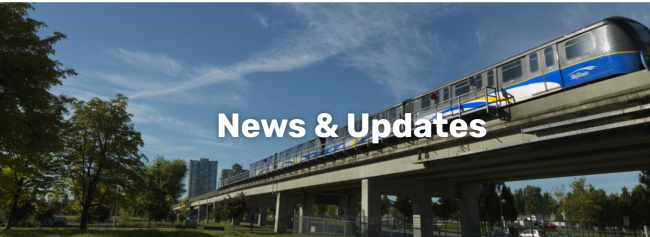Articles Menu

July 25, 2024
As TransLink and the Mayors’ Council continue to navigate the ongoing financial challenges facing Metro Vancouver’s transit system, a new report sheds light on the catastrophic cuts to transit service that could come as soon as 2025 unless the B.C. Government works with TransLink to fix its broken funding model.
With the October 19 provincial election on the horizon, we are calling on all provincial political parties to commit to helping us avoid these drastic cuts. See below for the details, and stay tuned for more information on how you can help us make public transit a key issue in this election. Your voice helps ensure these essential services will remain a priority for decision-makers.
Today, TransLink unveiled a new report detailing the dire potential transit service cuts necessary to close its increasing funding gap, despite implementing $90 million in corporate cost-efficiency and revenue measures.
The eye-opening report indicates that, without a new funding model, half of transit services could be cut by the end of 2025 – severely impacting commuters, businesses, and the overall livability of our communities. This includes halving bus services (including all NightBus routes), cutting SkyTrain and SeaBus trips by up to one-third, reducing HandyDART services, and potentially eliminating the West Coast Express service altogether. Read the news release and full report here.
In response to this grim report and the looming crisis, the Mayors’ Council is urging immediate action from the next provincial government to prevent these drastic service reductions and secure a sustainable future for our transit system.
In an open letter to B.C.’s political party leaders, we are highlighting the impacts of potential cuts and asking for their commitment to working with the Mayors’ Council and TransLink on solutions immediately following the election.
These solutions include creating a $3.4 billion per year Access for Everyone Fund indexed to population growth and inflation, including identifying $500 million in new sustainable operating revenues, and investing $2.9 billion per year in senior government contributions to the capital projects in the Access for Everyone plan.
We are also asking all the political parties to commit to creating a provincial program to provide transit fare discounts or exemptions for low-income youth, adults and seniors, and reviewing TransLink’s governance structure to ensure local accountability.
Read our statement and the letter to party leaders here.
The Mayors’ Council welcomes investments by the Federal Government in public transit, however recent announcements involve funding previously committed and unfortunately will not address TransLink’s current financial crisis.
The renewal of the Canada Community-Building Fund (formerly the Gas Tax Fund) announced earlier this month does not provide new funding for TransLink but confirms continued support at existing levels that has been in place since 2005. While this renewal is crucial and welcome, it does not address TransLink’s projected $600 million annual operating budget shortfall that begins in 2026.
Similarly, the Canada Public Transit Fund, formerly called the Permanent Transit Fund, provides capital funding starting in 2026 will not address TransLink’s operating deficit.
As we approach October’s provincial election, stay tuned for more updates and information on how you can help advocate for the future of our region’s transit system. We urge you to stay engaged, spread the word, and advocate for sustainable transit funding with your local candidates.
Thank you for your support as we navigate these challenging times. We need your support now more than ever.
TransLink respects the Indigenous Nations within the Lower Mainland and acknowledges all First Nations, Inuit, and Métis Peoples for their continued resilience, sustainable stewardship, and role as active members of the community for generations to come.
We recognize that in planning and managing the region’s transportation system we have a major role to play in supporting reconciliation with Indigenous Peoples.